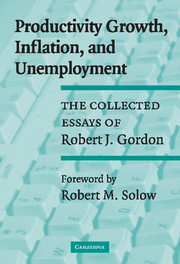Book contents
- Frontmatter
- Contents
- Foreword by Robert M. Solow
- Preface
- Introduction
- PART ONE THE HISTORY, THEORY, AND MEASUREMENT OF PRODUCTIVITY GROWTH
- Part One Introduction
- 1 Does the “New Economy” Measure Up to the Great Inventions of the Past?
- 2 Interpreting the “One Big Wave” in U.S. Long-term Productivity Growth
- 3 The Disappearance of Productivity Change
- 4 The Concept of Capital
- 5 Is There a Tradeoff between Unemployment and Productivity Growth?
- 6 Forward into the Past: Productivity Retrogression in the Electric Generating Industry
- PART TWO INTERPRETING PRODUCTIVITY FLUCTUATIONS OVER THE BUSINESS CYCLE
- PART THREE THE THEORY OF THE INFLATION-UNEMPLOYMENT TRADEOFF
- PART FOUR EMPIRICAL STUDIES OF INFLATION DYNAMICS IN THE UNITED STATES
- Subject Index
- Author Index
- References
5 - Is There a Tradeoff between Unemployment and Productivity Growth?
Published online by Cambridge University Press: 10 December 2009
- Frontmatter
- Contents
- Foreword by Robert M. Solow
- Preface
- Introduction
- PART ONE THE HISTORY, THEORY, AND MEASUREMENT OF PRODUCTIVITY GROWTH
- Part One Introduction
- 1 Does the “New Economy” Measure Up to the Great Inventions of the Past?
- 2 Interpreting the “One Big Wave” in U.S. Long-term Productivity Growth
- 3 The Disappearance of Productivity Change
- 4 The Concept of Capital
- 5 Is There a Tradeoff between Unemployment and Productivity Growth?
- 6 Forward into the Past: Productivity Retrogression in the Electric Generating Industry
- PART TWO INTERPRETING PRODUCTIVITY FLUCTUATIONS OVER THE BUSINESS CYCLE
- PART THREE THE THEORY OF THE INFLATION-UNEMPLOYMENT TRADEOFF
- PART FOUR EMPIRICAL STUDIES OF INFLATION DYNAMICS IN THE UNITED STATES
- Subject Index
- Author Index
- References
Summary
The Transatlantic Divide
Over the past decade there has been a steady divergence in the interests of European and American macro and labor economists. Persistently high unemployment in Europe has held center stage in the concerns of Europeans, and little consensus has emerged regarding the share of blame to be attributed to cyclical or structural factors, nor on the particular mix of structural factors to be held responsible. In the United States, by contrast, there is near total agreement that fluctuations in unemployment have been cyclical in nature, and that the underlying “Non-Accelerating Inflation Rate of Unemployment” (NAIRU) has changed little over the past two decades. Since there are few puzzles in the behavior of unemployment, American economists have increasingly shifted their emphasis toward the view that the central problems of the U.S. economy are (1) slow growth in productivity and in real wages, and (2) an increasing dispersion of the income distribution that has resulted in an absolute decline in real wages for workers below the twentieth or even the fiftieth percentile (depending on the exact measure used).
This chapter explores the hypothesis that the divergence of emphasis across the Atlantic is misplaced, and that the apparently separate problems of high unemployment in Europe and low productivity growth in America may be interrelated. Is there a trade-off between low unemployment and high productivity growth? If so, what factors have caused Europe and America to move to different positions on the unemployment-productivity trade-off (UPT) schedule?
- Type
- Chapter
- Information
- Productivity Growth, Inflation, and UnemploymentThe Collected Essays of Robert J. Gordon, pp. 143 - 171Publisher: Cambridge University PressPrint publication year: 2003



